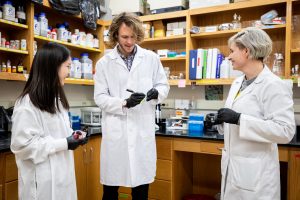Prefrontal cortex (PFC)-dependent cognition allows people to plan, avoid distractions and stay on track to meet their goals as they make decisions throughout their day.
Department of Psychology Chair and Professor Craig Berridge focuses on this PFC-dependent cognition in his Neural Systems and Behavioral Lab which studies the neurotransmitter regulation of behavior. This PFC-dependent cognition relates to planning, attention, working memory and response inhibition.

“[PFC-dependent cognition] is really a critical aspect of functional human behavior,” Berridge says. “Disruption [in PFC-dependent cognition] really interferes with our ability to function well in modern society.”
A nonfunctioning PFC is associated with distractibility and impulsiveness. Many psychiatric disorders such as schizophrenia, depression and ADHD are associated with impaired prefrontal cognitive function.
Berridge researches how drugs used to treat ADHD in particular improve higher cognitive function. He uses insights from this research to uncover new information about the neural mechanisms involved in PFC-dependent cognition, which could be used to benefit individuals suffering from prefrontal cognitive dysfunction.
“I have long been motivated to conduct research that can ultimately benefit people with clinically defined behavioral disorders,” Berridge says.
Berridge has been with the Department of Psychology for 28 years and has served as the Department Chair for the last 4 years.
During his time as Chair, the Mark and Ilene Laufman Family Professorship has helped to allow his research to continue to thrive. The Laufman Family Professorship was created in recognition that Chairs have less time to dedicate to overseeing and assisting in their own research.
Berridge says the funds have allowed his lab to keep moving forward while he has balanced the additional duties associated with serving as Chair, especially during the COVID-19 pandemic.
“I am incredibly grateful for this professorship and to the Laufman Family for their generosity and foresight in creating this Professorship,” Berridge says. “The flexible funds associated with this professorship have been essential in keeping outstanding staff in the lab who have helped the lab maintain strong momentum during my years as Chair. Having some funds that can support staff who can carry on in your absence is a really impactful thing.”

Some of Berridge’s early research focused on understanding how the most effective drugs used to treat ADHD, psychostimulants, improve PFC-dependent cognition. Millions of people are treated with low doses of psychostimulants to help treat the cognitive symptoms of ADHD.
Though these psychostimulants are effective, they can come with some risks for abuse. On college campuses and in high schools, illicit use of the drugs includes giving them to friends. Abuse of the drug includes taking more than prescribed.
“My goal was to help the field develop comparably effective drugs that were not at risk of abuse and misuse,” Berridge says. “We now know [psychostimulants are] highly safe when used as prescribed, but there’s still concern about their abuse potential.”
Neuroscientists had extensively studied how the higher doses of psychostimulants used recreationally impact the brain, but not how the lower doses used to treat ADHD improve prefrontal cognitive function without arousal enhancing potential.
Berridge and his team demonstrated that the ability of these drugs to enhance PFC-dependent cognition involves their direct action in the PFC. This work suggested that new treatments for ADHD should focus on neurotransmitters that act in the PFC to regulate this cognition.
Berridge’s most recent work investigates a neuropeptide transmitter that has long been recognized within the PFC. Decades of research had studied this corticotropin-releasing factor (CRF) outside of but not within the PFC. Berridge’s research provided the first demonstration that the activation of CRF receptors impairs PFC-dependent cognition.
Berridge and his team have shown that blocking CRF receptors pharmacologically and inhibiting CRF neurons can improve prefrontal cortex cognition, similar to ADHD treatments.
“The ability to improve cognition is similar to what we see with psychostimulants, so it suggests potentially, that it could be a new route for the treatment of ADHD, or at least it’s a new route to improve prefrontal cognitive function in whatever the condition might be,” Berridge says.
Much of Berridge and his team’s current research would not have been possible 10 years ago but has been made possible by recently developed chemogenetic advances in neuroscience.
“The truly surprising event has been the explosive growth in neuroscience-related tools that allow us to answer questions we could only dream of approaching 20 years ago,” Berridge says.
Berridge and his team most recently started using viral vector tools to insert certain genes into specific cell types in the PFC to explore how this cognition works. This lets them selectively activate or inhibit these cells or visualize when these neurons are active while animals engage in a cognitive task.
“Collectively, this work provides novel and translationally relevant insight into the neurobiology of higher cognitive function,” Berridge says. “The fact that this new information could potentially benefit clinical populations that suffer from prefrontal cognitive dysfunction, is particularly exciting to me.”